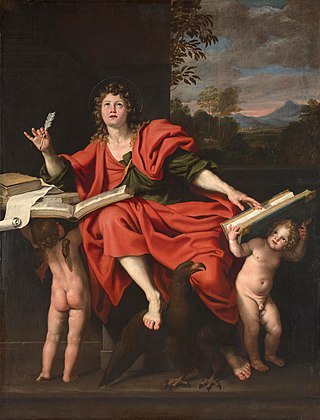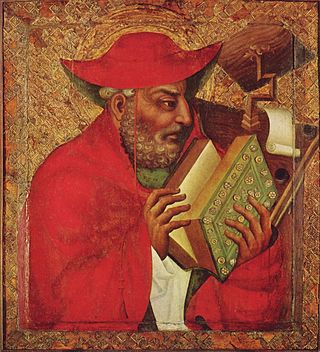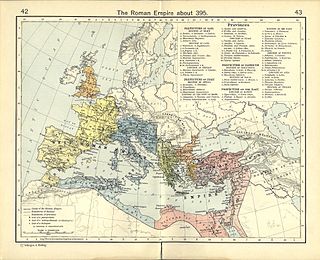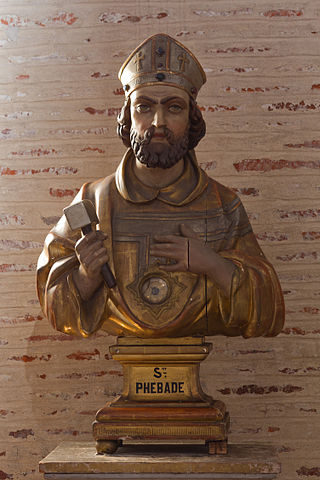De viris illustribus (Latin, 'On Illustrious Men') is a literary genre found in ancient Roman, medieval and Renaissance literature.
Works titled De viris illustribus include:

James the Less is a figure of early Christianity, one of the Twelve chosen by Jesus. He is also called "the Minor", "the Little", "the Lesser", or "the Younger", according to translation. He is not to be confused with James the Great. He is identified by some as James, son of Alphaeus and as James, brother of Jesus, thought of by Jerome and others as really the cousin of Jesus. James the Less has traditionally been commemorated along with St. Philip in the Western Christian calendars. Their feast day was observed on May 1 until 1955, when it was moved to May 11 to accommodate the Feast of St Joseph the Worker on May 1. A later revision of the calendar moved the feast back to May 3.

Simon the Zealot or Simon the Canaanite or Simon the Canaanean was one of the most obscure among the apostles of Jesus. A few pseudepigraphical writings were connected to him, but Saint Jerome does not include him in De viris illustribus written between 392 and 393 AD.
Symmachus translated the Old Testament into Greek. His translation was included by Origen in his Hexapla and Tetrapla, which compared various versions of the Old Testament side by side with the Septuagint. Some fragments of Symmachus's version that survive, in what remains of the Hexapla, inspire scholars to remark on the purity and idiomatic elegance of Symmachus' Greek. He was admired by Jerome, who used his work in composing the Vulgate.
Gennadius of Massilia, also known as Gennadius Scholasticus or Gennadius Massiliensis, was a 5th-century Christian priest and historian.

The Acts of Peter is one of the earliest of the apocryphal Acts of the Apostles in Christianity, dating to the late 2nd century AD. The majority of the text has survived only in the Latin translation of the Codex Vercellensis, under the title Actus Petri cum Simone. It is notable for a description of a miracle contest between Saint Peter and Simon Magus, the first record of the tradition that Saint Peter was crucified head-down, and as the origin of the saying "Quo vadis?".

De Mulieribus Claris or De Claris Mulieribus is a collection of biographies of historical and mythological women by the Florentine author Giovanni Boccaccio, composed in Latin prose in 1361–1362. It is notable as the first collection devoted exclusively to biographies of women in post-ancient Western literature. At the same time as he was writing On Famous Women, Boccaccio also compiled a collection of biographies of famous men, De Casibus Virorum Illustrium.

John the Presbyter was an obscure figure of the early Church who is either distinguished from or identified with the Apostle John and/or John of Patmos. He appears in fragments from the church father Papias of Hierapolis as one of the author's sources and is first unequivocally distinguished from the Apostle by Eusebius of Caesarea. He is frequently proposed by some as an alternative author of some or all of the Johannine books in the New Testament.

De Viris Illustribus, meaning "concerning illustrious men", represents a genre of literature which evolved during the Italian Renaissance in imitation of the exemplary literature of Ancient Rome. It inspired the widespread commissioning of groups of matching portraits of famous men from history to serve as moral role models.

De viris illustribus is an unfinished collection of biographies, written in Latin, by the 14th century Italian author Francesco Petrarca. These biographies are a set of Lives similar in idea to Plutarch's Parallel Lives. The works were unfinished. However he was famous enough for these and other works to receive two invitations to be crowned poet laureate. He received these invitations on exactly the same day, April 8, 1341, one being from the Paris University and the other from the Roman Senate. He accepted the Roman invitation.

De Viris Illustribus is a collection of short biographies of 135 authors, written in Latin, by the 4th-century Latin Church Father Jerome. He completed this work at Bethlehem in 392–393 AD. The work consists of a prologue plus 135 chapters, each consisting of a brief biography. Jerome himself is the subject of the final chapter. A Greek version of the book, possibly by the same Sophronius who is the subject of Chapter 134, also survives. Many biographies take as their subject figures important in Christian Church history and pay especial attention to their careers as writers. It "was written as an apologetic work to prove that the Church had produced learned men." The book was dedicated to Flavius Lucius Dexter, who served as high chamberlain to Theodosius I and as praetorian prefect to Honorius. Dexter was the son of Saint Pacianus, who is eulogized in the work.

Stridon was a town in the Roman province of Dalmatia. The town is known as the birthplace of Saint Jerome. From Stridon also came the priest Lupicinus of Stridon. Although Domnus of Pannonia, a bishop who took part in the First Council of Nicaea, is often said to have hailed from or been bishop of Stridon, he was in fact bishop of Sirmium. In 379 the town was destroyed by the Goths. Jerome wrote about it in his work De viris illustribus: "Jerome was born to his father Eusebius, [in the] town of Strido, which the Goths overthrew, and was once at the border between Dalmatia and Pannonia.".
Gregory Baeticus was the bishop of Elvira, in the province of Baetica, Spain.

Saint Pacian (Pacianus) was a bishop of Barcelona during the fourth century. He was bishop from about 365 AD to 391 AD, succeeding Praetextatus (Pretextat), who had attended a church council at Sardica in 347 AD and who is the first recorded bishop of Barcelona.
The Enmannsche Kaisergeschichte is a modern term for a hypothesized Latin historical work, written in the 4th century but now lost.
Ebion was the presumed eponymous founder of an early Christian group known as the Ebionites. The existent historical evidence indicates that the name "Ebionite" is derived from a Hebrew word, "ebion" (אביון) meaning "poor" and thus not from someone's name. Ebion is generally seen today as a purely literary figure, whose reputed existence in antiquity was used to explain where the Ebionites got their inspiration. However, once he had been accepted as real, a small tradition developed around him that lasted in early learned Christian circles for a few centuries.

Phoebadius of Agen was a Catholic bishop of the fourth century. At the Council of Ariminum in 359 and other councils, he was a supporter of Nicaean orthodoxy. He wrote several works, including a treatise against the Arians which still survives.
De scriptoribus ecclesiasticis is the title of many works:
Marcian of Rhossos was the leader of a Docetic sect of Christianity at Rhossos, only known as the alleged author of the Gospel of Peter. He may possibly be the same person as Marcion of Sinope, a similarly Docetic heretic in the second century.
Maximus of Antioch was Bishop of Antioch between 182 AD or 188 AD and 191 AD. He is considered the eighth patriarch of Antioch, being the successor of Theophilus and predecessor of Serapion. According to Saint Jerome in De Viris Illustribus, Maximus wrote about the origin of evil and the creation of matter.

Fra Giovanni Colonna (1298? – 1343/44) was an Italian Dominican friar and scholar. Educated in France, he served as a preacher and vicar in Rome, chaplain in Cyprus and lector in Tivoli. He lived and worked in Avignon for a time and traveled widely in the Near East during his Cypriot period.